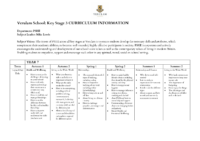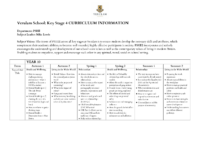PSHE
The intent of PSHE across all key stages at Verulam is to ensure students develop the necessary skills and attributes, which complement their academic abilities, to become well-rounded, highly effective participants in society. PSHE incorporates and actively encourages the understanding and development of our school’s five core values as well as the contemporary values of living in modern Britain. Enabling students to empathise, support and encourage each other in any spiritual, moral, social or cultural setting.
Students are given opportunities to engage in real world settings, debate and discuss to widen their perspectives and understanding. Students are actively encouraged to see the barriers present in life, for themselves and others, and to appreciate the tenacity and perseverance it takes to overcome these.
The curriculum is designed to ensure that students know how to keep themselves healthy and safe physically, mentally and socially. As a result of their studies students will know their personal worth and what to do to keep growing as they move through the school and out into the wider world. PSHE is intended to enable students to thrive in their future lives by developing the highly regarded and undoubtedly important, soft and transferable skills essential in an adult world. To reflect the significance of PSHE, the subject is prioritised so that it is delivered consistently as a timetabled lesson throughout a students’ time at Verulam.
To ensure that we are providing a coherent, compliant PSHE/RSE curriculum, we follow an adapted version of the PSHE Association programme of study, which brings together PSHE, emotional literacy, social and employability skills and Relationships, Sex and Health Education in a comprehensive scheme of learning. The PSHE curriculum is divided into 3 clear sections: Health and Wellbeing, Living in the Wider World and Relationships and follows the statutory guidance for Relationships Education, Relationships and Sex Education (RSE) and Health Education, published by the Department for Education (DfE) in June 2019.
IMPLEMENTATION:
- Ensure that the KS3 curriculum builds upon the topics and skills student’s study at KS2
- Topics and skills are reviewed and repeated in a spiral curriculum so that they are revisited
- Review assessments to ensure students are provided with opportunities to effectively demonstrate their learning
- Develop student’s critical thinking skills through the analysis of source material
CITIZENSHIP
The intent of the Citizenship curriculum at Key Stage 3 is to create individuals who are open-minded, critical thinkers. They will develop knowledge of the world, its global politics, social issues and personal matters. Students will have the experience of being exploratory learners, encouraged to develop their own opinions through self-expression and discussion, but also by listening and considering the thoughts and feelings of others.
Citizenship is an inclusive subject designed to raise a student’s awareness of their rights and responsibilities in, and to, their community and wider society. It will model the values of living in modern day Britain, including tolerance, respect and living by the rule of law. Students will develop their political literacy and understand the importance of actively taking part in democracy, with all that entails.
The curriculum in Years 7, 8 and 9 builds deep, secure foundations to ensure student’s progress confidently and positively onto GCSE and A-Level routes in subsequent key stages.
At its core, Citizenship has a human focus that enables all students to understand the world around them, how they fit into it and how they can make a positive impact.
IMPLEMENTATION:
- Topics and skills are reviewed and repeated in a spiral curriculum so that they are revisited
- Review assessments to ensure students are provided with opportunities to effectively demonstrate their learning
- Develop student’s critical thinking skills through the analysis of source material





